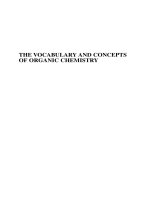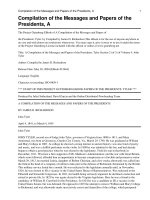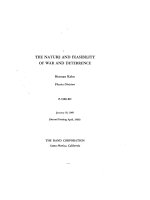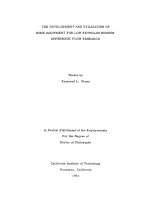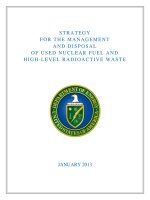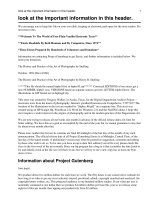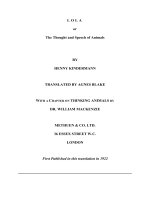The Society and Culture of Major EnglishSpeaking Countries
Bạn đang xem bản rút gọn của tài liệu. Xem và tải ngay bản đầy đủ của tài liệu tại đây (237.19 KB, 27 trang )
C&L.05.08
The Society and Culture of Major English-Speaking Countries
Question 1:
“British history has been a history of invasion.” Please illustrate this
point.
• 4th century BC: Britain = Briton, and the people here were called Britons.
They belong to the Celtic race
• 1st century AD (43): Briton was invaded by the Roman Empire. England
and Wales (though not Scotland or Ireland) became a part of the Roman
Empire for nearly 400 years.
• 5th century AD (410): Anglo-Saxon invasion - Germanic peoples: the
Angles, and the
• From the late 8th century on, raiders from Scandinavia, the cruel Vikings,
threatened Britain's shores. The English heroes were truly English (AngloSaxon), such as King Alfred the Great
• The next invaders were the Normans, from northern France in 1066.
• Next few hundred years: a process of joining together the various parts of
the British Isles under English rule.
C&L.05.08
The Society and Culture of Major English-Speaking Countries
Question 2
What are some general characteristics of Scotland? How did
Scotland become part of the union of Great Britain?
• the second largest of the four nations, both in population and in
geographical area.
• the most confident of its own identity
• the most rugged part of the UK, with areas of sparsely populated mountains
and lakes in the north (the Highlands), and in the south (the Southern
Uplands).
• Scotland was not conquered by the Romans or the Anglo-Saxons
• Scotland began to experience Viking raids in the 9th century, and it was the
pressure from this outside threat that led Scottish kings to unify, forming an
independent singular Scottish state
• In 1314, the Scottish defeated the English at the Battle of Bannockburn,
leading to 300 years of full independence.
• In 1603, Queen Elizabeth the First of England died childless, so James the
Sixth of Scotland became James the First of England, uniting the two
thrones. But for another hundred years Scotland maintained its separate
political identity.
• In 1707 the English and Scottish parliaments decided to form a union based
on agreement. Great Britain was established
• The dream of an independent Scotland has not vanished. Scotland elects its
members of parliament to the London parliament and sends 72
representatives to London.
C&L.05.08
The Society and Culture of Major English-Speaking Countries
Question 3
“Ireland has been divided by a long and bloody conflict.” Please
illustrate this point. What do you know about the Good Friday
Agreement?
Ireland has been divided by a long and bloody conflict:
• From the time of Queen Elizabeth I (late 1590s) the new settlers, loyal to
the British crown and Protestants in religious persuasion, were granted
land, position, and privileges (from Roman Catholic)
• In 17th century, English and Scottish Protestants were sent to Northern
Ireland to stop Irish Catholics from causing trouble.
• Fighting: English and Scottish Protestants against Irish Catholics
• The Irish Protestants helped the English and Scottish Protestants, so Irish
Catholics were defeaded. Irish Catholics had to escape to the South
(Republic of Ireland)
• In 1801 Ireland became part of UK.
• Until 1921 the UK was "The United Kingdom of Great Britain and
Ireland", not only "Northern Ireland".
• In 1921, Ireland was divided into 2 parts:
- Northern Ireland: belonging to UK
- Republic of Ireland/ Irish Republic: independent
C&L.05.08
The Society and Culture of Major English-Speaking Countries
Question 4
What do you know about the Head of the UK? Why is she said to
reign but not to rule?
The Queen reigns but doesn’t rule
In 16th and 17th centuries: a struggle for power between the Monarch and the
Parliament. The Par. controlled most of national wealth so the Par. won.
The Par. allowed the Monarch to continue to function but within certain limits/
under the Par.’s control
The Queen:
represents Britain at home and abroad;
sets standards of good citizenship and family life
In law, the Queen is:
- head of state
- head of the executive and the judiciary
- head of the Church of England
- commander-in-chief of the armed forces
The Queen’s remaining powers:
- to summon, prorogue or dissolve the Parliament;
- to give Royal Assent/Agreement to legislation passed by the Par.;
- to appoint importain positions;
- to confer honours;
- to remit sentences;
- to declare war or make peace;
but all are under the Parliament’s control or direction
C&L.05.08
The Society and Culture of Major English-Speaking Countries
Question 5
What do you know about the British Parliament and the Prime
Minister?
The Parliament
• The Parliament today consists of the Queen, the House of Lords and the
House of Commons.
• House of Lords: consists of about 1185 hereditary and life peers and
peeresses; 2 Archbishops ; and 24 most senior bishops.
• House of Commons: consist of 651 elected members from 651
constituences. They becomes Members of Parliament (MPs)
• Par. is the seat of British democracy
• The House of Lords was created to provide a council of the nobility for the
King.
• The Commons was summoned to provide the King with money.Because of
the financial power, from 17 th century, the Commons gained power in
matters of finance as well as of legislation over both the Monarch and the
Lords.The Commons can force the government to resign by passing a
resolution of “ no confidence”.
• Parliament’s functions:
- to pass laws
- to raise monney through taxation to enable the government to function.
- to examine the government policy, administration and expenditure
- to debate or discuss major political issues.
The Prime Minister:
- the most powerful
- leader of the winning/ majority Party in the general election
- appoints about 100 ministers
- chooses about 20 among the ministers to form the Cabinet
C&L.05.08
The Society and Culture of Major English-Speaking Countries
Question 6
What is the importance of general elections in the UK? When do
elections occur? Who can stand for election as an MP? What are the
main parties in the UK?
• The election an opportunity to influence future government policy.
When Do Elections Occur?
• After a government has been in power for 5 years it has to resign and
hold a "general election“.
• The Prime Minister can call an election sooner than 5 years (when the
gov. loses a "vote of no confidence" in the House of Commons.
Who Can Stand for Election as an MP?
• Anyone who is eligible to vote can stand as an MP.
• If you are not the candidate put forward by one of the main political parties
you are unlikely to persuade many people to vote for you.
The Political Parties
There are three major national parties:
- the Conservative Party,
- the Labour Party,
- the Liberal Democrats (Alliance).
C&L.05.08
The Society and Culture of Major English-Speaking Countries
Question 7
How are the people in the UK divided into different classes? What
are some of the main features in the division? Is the class system
similar to that of the US?
• British society: class-structure society consisting of Upper class; Middle
class; Lower/Working class
• British people grow up with a deep knowledge and understanding of the
class system.
• Class-divisions are not simply economic, but it is important to come from a
particular kind of family (family background)
• The British class-system is a hereditary aristocracy or based on family
background. The American class-system is based on the finance.
C&L.05.08
The Society and Culture of Major English-Speaking Countries
Question 8
Please define “absolute decline and relative decline” in the UK
economy. What are the reasons for the absolute decline and relative
decline?
Absolute Decline and Relative Decline
• By the 1880s the British economy was dominant in the world, producing
one third of the world's manufactured goods, half its coal and iron, half its
cotton.
• From 1945 until the present, the UK economy is usually thought of as one
of decline:
• First, the country had gone heavily into debt in order to finance the war.
These debts meant that the UK entered the post-war era with a major
economic problem.
• Second, the era of empire was over. India, popularly known as "The Jewel
in the Crown" of the British Empire, gained its independence in 1947, only
2 years after the end of the war
• Third, Britain was still forced to maintain a substantial and expensive
military presence in many overseas locations
• Fourth, although Britain was quite badly damaged by German bombing
during the war, its industry survived comparatively unaffected. British
industry could continue with its older factories and pre-war products, and
given its other economic problems.
• In fact, this was not an absolute decline: Britain is not poorer, or producing
less than it was in 1945, but it is a lot wealthier and more productive than it
was then.
• It has in fact been a period of steady economic growth and rapidly
increasing living standards.
C&L.05.08
• British economy has improved, but other countries have improved more
rapidly (from being the 2nd largest economy to being the sixth).
• The UK has experienced economic decline, but this decline is relative to
some other economies rather than absolute.
C&L.05.08
The Society and Culture of Major English-Speaking Countries
Question 9:
What are the purposes of the British education system? How does the
British education system reflect social class?
School is about teaching children "the three R's” (reading, writing and
arithmetic) to provide children with literacy and the other basic skills they will
need to become active members of society.
British education system also socialises children.
Children are taught practical skills; but in school they also learn the rules and
values to become good citizens, to participate in the community, and to
contribute to the society
Britain is a society in which social class is still very important: class inequality
can be erased or continued according to educational policy. The schools you
attend are the marker that identifies your social class.
In Britain, where you are educated is still very important to your future.
C&L.05.08
The Society and Culture of Major English-Speaking Countries
Question 10:
What do you know about the present British education system?
What is the Open University in Britain? What do you think of this
system?
Present Education System
• Education in the UK is compulsory, from the ages of 5 (4 in Northern
Ireland) to 16.
• Parents can choose between sending their children to state schools or to
private schools.
• Since 1993, parents have the right to express a preference for a particular
state school for their children → good schools tend to be for the wealthier
middle classes.
• Independent schools are commonly called public schools.
• Up to age 5, children may have some pre-primary schooling in nursery
schools, daycare, or play groups.
• Between the ages of 5 to 11, pupils mainly attend state sector primary
schools.
• These schools are called co-educational or mixed schools because they
admit both boys and girls.
• From the age of 11 up to around the age of 19, students attend secondary
schools. About 90% of secondary schools are comprehensive schools which
admit children without reference to their academic abilities.
• These schools provide a general education. Pupils can study everything
from academic subjects like literature and sciences, to more practical
subjects like cooking and carpentry.
C&L.05.08
• Those children who do not attend comprehensive schools attend grammar
schools.
• Grammar schools select children, usually at the age of 11, through an
examination called "the 11-plus".
• After 5 years of secondary education, (at about age 16) English, Northern
Irish and Welsh students sit their GCSE exams (General Certificate of
Secondary Education).
• Based on these results, pupils can have a number of choices: to quit school
and find a job; or to sit exams for university entrance; or to concentrate on
vocational training.
• Pupils who hope to attend university carry on their academic study in the
sixth form for a further two years and then sit A-levels exams (General
Certificate of Education-Advanced).
• Most pupils try to achieve 3 or 4 A-levels in the subjects they are most
proficient at.
• Pupils who decide not to go to university may choose to take vocational
training.
• The vocational equivalent of A-levels are GNVQs (General National
Vocational Qualifications), which provide a broadly based preparation for
work or for taking further vocational .
The Open University offers a non-traditional route for people to take university
level courses and receive a university degree. People can register without
having any formal educational qualifications.
C&L.05.08
The Society and Culture of Major English-Speaking Countries
Question 11:
How did the British Empire end? How is the British foreign policy
formed?
The age of imperialism was over.
• On the one hand, the British could no longer afford to maintain its empire;
while Britain had won the war, it had paid a terrible price in terms of lives
and in terms of economic destruction.
• On the other hand, the British realised that countries should be granted the
independence and left to run their own affairs.
• The end of the great British empire was surprisingly rapid.
• In the 1940s, many countries were granted independence and left the
Commonwealth, refusing to recognise the British monarch as the head of
their new states.
How Foreign Policy is Made
• The Prime Minister and Cabinet decide on the general direction of Britain's
foreign policy.
• The main government department involved is of course the Foreign and
Commonwealth Office (FCO).
• The Ministry of Defence is responsible for ensuring Britain's defence and
managing Britain's involvement in its military treaty commitments.
• The Department of Trade and Industry is concerned with formulating
international trade policy and managing British commercial relations with
other countries.
• The Treasury makes decisions on how much money other departments can
have each year.
C&L.05.08
• Since Britain is a parliamentary democracy, the government's foreign policy
in theory represents the desires of its electorate.
C&L.05.08
The Society and Culture of Major English-Speaking Countries
Question 12:
What do you know about the first white colonists in America? Why did
they go there?
The Settlement in Virginia
• In 1606, the first white Americans left England.
• The first English permanent settlement was founded in 1607 in Virginia.
• When the colonists settled down, they did not grow food. A few laborers
started to dig for gold and look for other riches while those English
gentlemen were idle, doing nothing.
• Unfortunately, nothing was found → they ran into the shortage of food.
• When the second group of men were sent with supplies, only 38 of the first
arrivals were dead → Jamestown was in a great crisis.
• When Captain John Smith took the leadership, he imposed discipline by
making everyone work.
• A few years later, another colonist, John Rolfe began to experiment with the
West Indian Tobacco and this plant grew well in Virginia soil → They
became successful by selling tobacco to Europe.
• John Rolfe married the princess of an Indian tribe chief → friendship
between the white and the Indians (native people)
• In 1619, two important events took place in Virginia:
- On July 30, 1619, in the Jamestown church, the delegates elected from
various communities in Virginia discussed the enactment of laws for the
colony.
- A month later, a Dutch ship brought in over 20 black slaves.
C&L.05.08
The Society and Culture of Major English-Speaking Countries
Question 13:
What do you know about the Puritans in New England? In what way
did Puritanism influence American culture?
Puritan New England
• In 1620, English puritans who separated themselves from the Church of
England took the ship Mayflower and left for North America → they
landed in New England.
• They thought that the Church of England was too catholic and wanted to
"purify" the church, hence the name "puritans".
• Puritans were convinced that human beings were predestined by God
before they were born.
• Puritans believed that everyone had a calling, which was given by God.
• The success of one's work or the prosperity in his calling was the sign of
being God's elect. Therefore, everyone must work hard, spend little and
invest for more business. Working hard and living a moral life were their
ethics.
• The Puritans believed that governments should enforce God's morality
→ They strictly punished drunks, adulterers…..
• The American values such as individualism, hard work, respect of
education owe very much to the Puritan beliefs.
C&L.05.08
The Society and Culture of Major English-Speaking Countries
Question 14:
What do you know about the Articles of Confederation in the USA?
Why did the Articles fail? What is the making of the USA
Constitution?
Articles of Confederation
• When the War of Independence was over, the United States was not one
unified nation.
• Each new state had its own government and was organized like an
independent nation → had its own laws and handled all of its internal
affairs.
• During the war, the states worked together by sending representatives to a
national congress.
• The Congress would raise money to pay off debts of the war, establish a
money system and deal with foreign nations in making treaties → the
Articles of Confederation.
• The Articles of Confederation failed because the states did not cooperate
with the Congress or with each other.
• Many Americans worried about the future → They believed that the
Congress needed more power.
• The Congress asked each state to discuss the changes which would be
necessary to strengthen the Articles of Confederation.
Constitution
• The Constitution of the United States: federal system with a strong central
government.
• The Constitution also called for the election of a national leader, or
president.
C&L.05.08
• Federal laws would be made only by a Congress made up of representatives
elected by the people.
• It also provided for a national court system headed by a Supreme Court.
• Government consisting of three parts, or branches: the executive, the
legislative, the judicial.
• States were allowed to run their own governments as they wished, provided
that their governments were republican.
• Government is set up by “We, the People" and its purpose is to “promote
the general welfare and secure the blessing of liberty to ourselves and our
posterity.”
C&L.05.08
The Society and Culture of Major English-Speaking Countries
Question 15:
What do you know about the executive and legislative branches in
the American Constitution? How does the system of “Checks and
Balances” work?
Legislative Branch
• The legislative branch is made up of elected representatives from all of
the states → the only branch that can make federal laws, levy federal
taxes, declare war or put foreign treaties into effect.
• The Congress is divided into two houses:
the Senate
the House of Representatives
• The House of Representatives: 435 representatives serving two-year
terms (435 representatives)
• The Senate: serving six-year terms (two senators/state) → only onethird of the Senate is elected every two years → experienced senators in
Congress after each election.
• The main duty of the Congress is to make laws
Executive Branch
The chief executive: the president. A president can be elected to only
two terms (4 years/term). The powers of the presidency are formidable,
but not without limitations. The President’s roles are to:
• propose legislation to Congress.
• veto any bill passed by Congress.
• influence public opinion regarding issues and legislation that he deems
vital.
• appoint federal judges as vacancies occur, including members of the
Supreme Court.
C&L.05.08
• issue regulations and directives regarding the work of the federal
government's many departments and agencies.
• appoint the heads and senior officials of the executive branch agencies.
• The president is primarily responsible for foreign relations with other
nations → appoints ambassadors and other officials, subject to Senate
approval → formulates and manages the nation's foreign policy.
Checks and Balances
• The system of "checks and balances" works to keep serious mistakes
from being made.
• Congress proposes a law → the president can veto → the proposal
return to where it is originated → if twothirds of the members of both
houses vote → it becomes the law.
• If Congress passes a law → it is challenged in the courts as
unconstitutional → Supreme Court has the power to declare the law
unconstitutional → it is no longer in effect.
• The president has the power to make treaties with other nations and to
make all appointments to federal positions, including the position of
Supreme Court justice.
• The Senate must approve all treaties and confirm all appointments
before they become official → the Congress can prevent the president
from making unwise appointments.
C&L.05.08
The Society and Culture of Major English-Speaking Countries
Question 16:
What do you know about the American Revolutionary War and the
Declaration of Independence?
The American Revolution
• In 1756, England and France began to fight the Seven Years' War: French
and Indian War.
• The British government argued that Britain had spent large sums of money
to defend their American colonies in those wars → the colonists should pay
a part of those expenses.
• British government forced the colonist to pay high taxes → unfair
• The colonists refused to obey the British laws → British soldiers were sent
to America..
• On April 19, 1775, the American War of Independence began → many
colonists felt that it was like brother fighting brother.
• On July 2, 1776, the Congress resolved that "these United Colonies are, and
of right ought to be free and independent states."
Declaration of Independence
• Thomas Jefferson of Virginia, assisted by John Adams and Benjamin
Franklin, drafted Declaration of Independence, which the Congress adopted
on July 4, 1776.
• The Declaration officially proclaimed the independence of 13 North
American colonies.
• The War of Independence came to an end in 1781 with the victory of North
Americans.
• The Treaty of Paris was signed in 1783 and Britain had to recognize the
independence of the United States. A new American nation was born.
C&L.05.08
The Society and Culture of Major English-Speaking Countries
Question 17:
What are the purposes of the American education? What do you
know about the educational system in the USA?
• The goal is to achieve universal literacy and to provide individuals with the
knowledge and skills necessary to promote both their own individual
welfare as well as that of the general public
• Each of the 50 states in the United States has its own laws regulating
education → some laws are similar; others are not.
• All states require young people to attend school.
• Every child is guaranteed up to 13 years of education regardless of a child's
race, religion, sex, learning problems, physical handicap or inability to
speak English.
• American students pass through several levels of schooling
• Elementary School: usually means grades kinder garten(K) through 8
(in some places, only grades K – 6). Grades 4, 5 and 6: "middle grade" school.
(elementary grades: "grammar school.")
• Secondary School: generally grades 9 – 12 (popularly called "high school").
In many districts "junior high school": grades 7 - 9.
• All six grades (7-12): "senior high school.”
• Certain subjects are taught in all K to 12 systems across the country.
• Elective courses vary from school to school.
C&L.05.08
The Society and Culture of Major English-Speaking Countries
Question 18:
What do you know about the native people living in the icy land in
Canada? (their origin, the life in the past and now....)
• In the icy land (far north): the Inuit (Eskimo).
• The Eskimo prefer to be called Inuit
• In their own language “Eskimo” means “eaters of raw flesh/meat”; “Inuit”
means “the people”.
• They are a group of original people living in the harsh conditions of the
Arctic climate.
• In the past, they used to be nomads:
travelling from place to place;
hunting seals and caribou;
living in tents made of caribou skins;
being cheerful and happy.
• The white arrived → they brought with them guns and machinery → found
gas and natural oil.
• It affected Inuit’s life:
giving up living as nomads to live in settlements;
not hunting;
spending time drinking in the pubs;
being unhappy.
• Canada's aboriginal peoples were vital to the fur trade → played a huge
role in Canada's economic development. They were treated very badly
by their white Europeans.
• Now:
hunting again with gun, snowmobiles, and canned food;
living in towns built by the government;
C&L.05.08
being trained for many kinds of jobs;
children going to school;
health being looked after.
• Aboriginal peoples are still Canada's poorest inhabitants
→ International human rights groups and the United Nations have criticized
the Canadian government's systematic discrimination against its native
population.
• Most Canadians agree that they have been treated badly for far too long
→ it is time for a change.
C&L.05.08
The Society and Culture of Major English-Speaking Countries
Question 19:
Who are the first white settlers and the first British settlers in
Canada? Why did they move there?
• In 1534, French explorers arrived → they met the Indians.
• Indians welcomed them, but in return they kidnapped Indian chiefs.
• In 1603, French fur-trading settlements were established in Canada
• By 17th century, French colonists were sent to Canada to supply food and
shelter to the fur-traders→ Quebec was founded
• French colonists were first white settlers in Canada.
• First British settlers: American refugees who avoided the American War of
Independence
